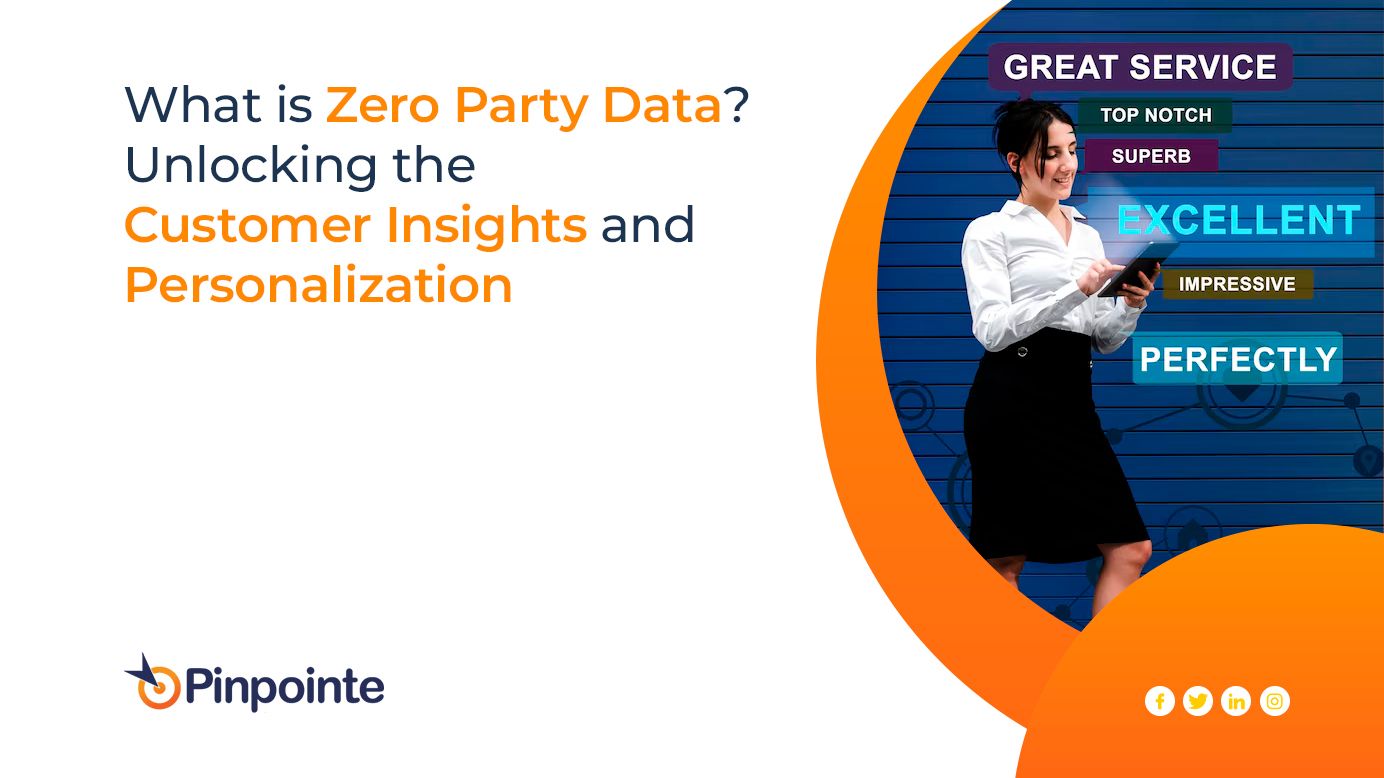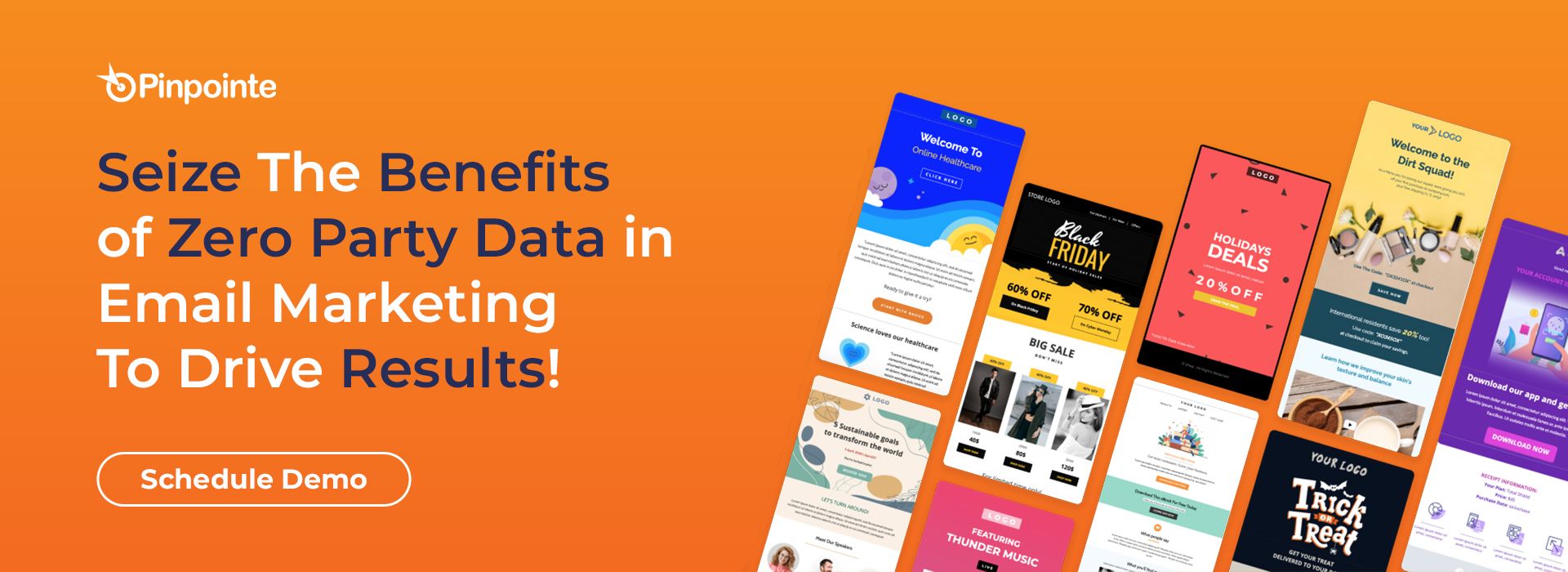
What is Zero Party Data? Unlocking the Customer Insights and Personalization
Table of Contents
Some comprehensive techniques give marketers the ability to capture zero-party data that is “Data that a customer intentionally and proactively shares with a brand, which can include preference center data, purchase intentions, personal context, and how the individual wants the brand to recognize her.”
In the ever-evolving landscape of online business, customer engagement has become a critical factor in driving success. Traditional methods of customer interaction are no longer sufficient to capture and retain the attention of today's savvy consumers. This is where zero party data steps in as a game-changer. By allowing customers to willingly share their preferences and information, zero party data opens up new avenues for personalized interactions and deeper relationships.
In this article, we'll explore how online businesses can leverage zero party data to enhance customer engagement, making use of tools such as customer engagement platform, email marketing tool, and effective email marketing tips.
Get benefits of zero-party data for custom email segmentation for customer centric marketing
Unlocking the Power of Data
Let’s move back – understanding the nuances of first-party, second-party, and third-party data is essential. Each type of data brings its own strengths and considerations to the table, paving the way for more effective customer engagement and strategic decision-making.
First-Party Data: Your Direct Connection to Insights
Imagine first-party data as the treasure trove of insights you gather directly from your customers. This valuable information stems from various sources, including comprehensive analytics from your website and social media channels. The uniqueness of first-party data lies in its ownership; it's your proprietary asset.
By delving into your social media and website analytics, you gain profound insights into customer behavior and preferences. This data is a goldmine for tailoring your strategies to resonate with your audience. In fact, recent studies underline its importance, with an impressive 85% of US marketers and 75% of Western European respondents prioritizing the expansion of their first-party data usage.
Second-Party Data: Sharing Relevance and Trust
Unlike first-party data, second-party data is a collaborative effort. It's the data you acquire from partners or businesses related to your niche. This type of data exchange brings mutual benefits, as you and your partner businesses share insights that align with your respective goals.
This invaluable information can be shared between companies or acquired from trusted data marketplaces. With its origins in diverse sources like on-site behaviors, social media interactions, and app engagement, second-party data offers a comprehensive view of customer preferences. Moreover, the fact that this data is collected with consumer consent ensures its credibility and relevance.
Third-Party Data: Navigating the Ocean of Insights
Enter the world of third-party data, notorious yet intriguing. This data is sourced from specialized companies dedicated to data collection and distribution. These data aggregators, adept at this craft, amass vast volumes of information from websites across the globe.
While third-party data is abundant and readily available, its universal accessibility poses a challenge. Competitors can also purchase the same data, diluting its exclusivity. It's worth noting that acquiring third-party data can involve a financial investment, although startup loans can help alleviate these costs.
Data-Driven Personalization: Start Your Zero Party Data Journey with Pinpointe!
Decoding Zero Party Data: A Customer-Centric Revelation
In the dynamic landscape of data dynamics, grasping the significance of zero party data unveils a new dimension of customer engagement. This type of data shines as a beacon of transparency, ushering in a paradigm where consumers willingly contribute valuable insights to businesses. In the quest for more personalized interactions and ethical data practices, zero party data emerges as a profound and mutually beneficial conduit.

Unveiling the Essence of Zero Party Data
Zero party data isn't just another data point; it's a treasure trove of customer-driven insights. Unlike third-party data procured from external sources, zero party data is a direct stream of information gifted by customers themselves. These insights encapsulate a spectrum of details, from preferences and interests to intentions of future purchases. It's as if customers have handed businesses the key to understanding their desires and needs.
A Transparent Path to Insightful Engagement
As the digital landscape evolves, consumers are more aware of their privacy rights and are increasingly cautious about sharing personal information. In this context, zero party data emerges as a beacon of ethical data collection. Customers willingly and transparently offer their data, fostering a relationship built on trust.
What makes zero party data truly exceptional is that it transcends transactional interactions. It opens the door to meaningful conversations, enabling businesses to curate offerings that resonate on a personal level. By understanding customers' desires at an intimate level, brands can craft experiences that are not only relevant but also deeply cherished.
Navigating the Era of Customer Empowerment
In a world where data ethics are in the spotlight, zero party data rises as a testament to customer empowerment. It aligns with the philosophy of putting control back into the hands of customers. By actively participating in sharing their preferences, interests, and aspirations, consumers reclaim ownership of their data.
This approach paves the way for businesses to foster a more profound connection with their audience. It signals a departure from generic mass marketing to tailored experiences that are a true reflection of individual tastes. By embracing zero party data, businesses signal their commitment to customer-centricity, establishing themselves as advocates of ethical data practices.
Elevating Engagement Through SEO Synergy
As this data narrative unfolds, optimizing content for search engines becomes paramount. Incorporating relevant keywords like "zero party data," "customer insights," and "ethical data collection" seamlessly weaves SEO strategies into the content. Crafting compelling meta descriptions that encapsulate the essence of zero party data can entice readers to delve further.
Additionally, ensuring a user-friendly experience through well-structured content and visually appealing elements enhances engagement. By combining SEO tactics with the allure of zero party data, businesses can create a content ecosystem that captivates both search engines and curious minds.
Empowering Future Interactions
Zero party data heralds a new dawn of customer-business relationships. It embodies transparency, respect for privacy, and a commitment to providing tailor-made experiences. As the digital landscape continues to evolve, businesses that embrace this ethical data stream will forge stronger bonds with their audience, fostering engagement that transcends transactions and transforms into lasting connections.
The Power of Personalization
Customer Engagement Platform: A customer engagement platform such as Pinpointe can play a pivotal role in harnessing the potential of zero party data. By consolidating customer interactions across multiple touchpoints, businesses gain a holistic view of their customers. This enables the creation of highly personalized experiences that resonate with individual preferences and behaviors.
Personalization is no longer limited to addressing customers by their first name in an email. With zero party data, businesses can tailor product recommendations, content suggestions, and communication timing based on customers' explicit preferences. This level of personalization demonstrates a genuine understanding of customers' needs, strengthening the emotional bond between the brand and its audience.
Revolutionizing Email Marketing
Email Marketing Tool: When it comes to leveraging zero party data, an email marketing tool like the one offered by Pinpointe can be a game-changer. Incorporating zero party data into email campaigns allows for highly targeted and relevant communication. Instead of sending generic messages to a broad audience, businesses can create segments based on specific preferences, purchase history, or stated interests.

Effective Email Marketing Tips: To make the most of zero party data in email marketing, watch one of the most interesting webinars on Effective Email Marketing Tips or utilize some of the following tips to create the best and engage your users. Start by crafting compelling subject lines that resonate with recipients' preferences. Include personalized product recommendations and offers based on their stated interests. Segment your email list to ensure that recipients receive content that aligns with their preferences. Moreover, optimize emails for mobile devices to cater to on-the-go consumers.
Strengthening Customer Relationships
In a survey by Accenture, it was revealed that 91% of consumers are more likely to shop with brands that recognize, remember, and provide relevant offers and recommendations. This highlights the importance of utilizing zero party data to build lasting customer relationships.
Landing Page Builder: To enhance engagement further, consider employing a landing page builder. This tool can help create landing pages that align with specific zero party data insights. For instance, if a customer has expressed an interest in eco-friendly products, a tailored landing page showcasing sustainable offerings can make a significant impact.
Transparency and Trust
The foundation of zero party data is trust. Today's consumers are more privacy-conscious than ever, demanding greater control over their personal information. Zero-party data thrives on the principle that customers willingly share their data when they trust it will lead to more personalized and relevant experiences. In this context, businesses have a crucial responsibility to honor that trust and maintain an unwavering commitment to data privacy.
In the realm of zero-party data collection, Pinpointe emerges as a reliable partner for businesses seeking to navigate this landscape while maintaining the highest standards of privacy and compliance. With its advanced forms, Pinpointe offers a solution that prioritizes transparency and user control. These forms, also known as zero-party data collectors, are carefully designed to ensure not only the collection of valuable insights but also the protection of user privacy.
Conclusion
The era of customer engagement has evolved beyond transactional interactions. Zero party data offers online businesses an opportunity to create meaningful relationships by tapping into customers' preferences and insights. With the right tools, such as customer engagement platforms, email marketing tools, and effective email marketing tips, businesses can transform this data into personalized experiences that resonate and convert.
By adopting a customer-centric approach and utilizing zero party data responsibly, online businesses can stand out in a crowded digital landscape, fostering loyalty and advocacy that goes beyond transactions, ultimately driving long-term success.
Pinpointe Newsletter
Join the newsletter to receive the latest updates in your inbox.


